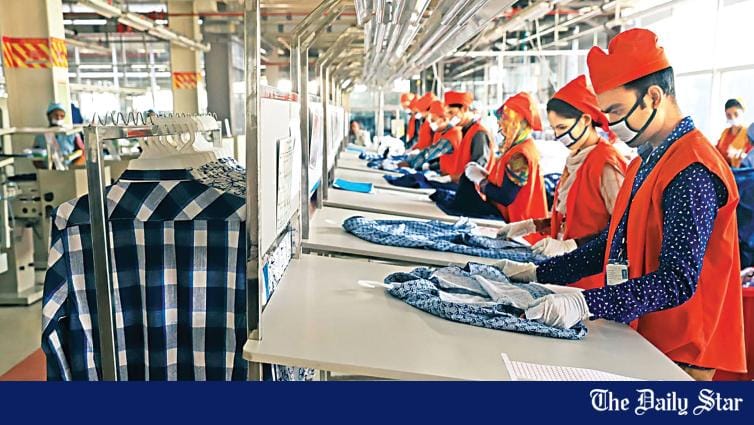Saif
Senior Member
- Joined
- Jan 24, 2024
- Messages
- 15,898
- Likes
- 7,990
- Nation

- Axis Group


RMG sector's 'green' transition
There can be any discussion that excludes the readymade garments (RMG) sector when it comes to energy transition. It is an established fact that this sector of the economy is representative of around 85 per cent of annual exports from the country and it has developed into a global player as far as
RMG sector's 'green' transition
Published :
Jun 19, 2024 21:50
Updated :
Jun 19, 2024 21:50
There can be any discussion that excludes the readymade garments (RMG) sector when it comes to energy transition. It is an established fact that this sector of the economy is representative of around 85 per cent of annual exports from the country and it has developed into a global player as far as apparel market is concerned. Hence, when it comes to battling environmental pollution, carbon footprint, etc., it is natural that interventions must include the sector. Over the last decade, the RMG factories in the country have been undergoing a quiet transformation, starting from becoming the most compliant country in terms of safety measures.
Over time, Bangladesh has also come into the limelight with 220 factories becoming 'green' adhering to LEED (Leadership in Energy and Environmental Design) - a globally recognised green building rating system that emphasizes environmental responsibility and energy efficiency. Reportedly, hundreds more factories are in the pipeline waiting for LEED certification and that points to a greater realisation by RMG owners that foreign consumers wish to wear apparels that are not only ethically sourced, but are made under environmentally-accepted conditions. The problem of course has always been financing. What was witnessed during Covid-19 pandemic was a slew of cancelled orders coupled with the fact that some of the major buyers of Bangladeshi apparels were refusing to pay for shipped goods. This created a lot of problems for RMG sector but those apparently have been ironed out and the sector has moved on. While the sector moved heaven and earth to become compliant on safety issues in the years after the Rana Plaza incident, the current global economic climate will not support the RMG sector to go green at the rate desired by foreign consumers because there simply isn't enough finance to make the impact necessary to make that happen.
In the midst of all this uncertainty, the much-needed (and awaited) green transition of the country's RMG industry has got a boost. What this means is that well-established global brands like H&M Group, Gap Inc, Mango and Bestsellter have committed to the first round of decarbonisation programme in the country. The financing model that has been launched is being headed by the Fashion Pact in partnership with Apparel Impact Institute, Guidehouse, and DBS Bank. This initiative intends to provide a "collective financing model" that will help support deep decarbonisation. Of course, the devil is in the details. Although it is mentioned that that technical and financial incentives will be employed to help more factories to adopt more environmentally-friendly electrification through the use of renewable-energy solutions, it remains to be seen precisely how much cost sharing will be done.
The initiative is a multi-year proposal that hopes to facilitate not only financial incentives but also technical support "to help suppliers identify and implement low-carbon technologies." A lot of promises have been made. While members of the initiative have been making enough noise that climate change is real and actions are needed, it is also a fact that successive COP conferences have failed to get developed countries to commit funds to already agreed upon climate-change funds for developing nations. One can only hope that the initiative (of collective financing model) will be backed up s with finance and technical assistance that is tailor-made for Bangladeshi companies and if that happens, decarbonisation can happen in a fruitful manner in the RMG sector.
Published :
Jun 19, 2024 21:50
Updated :
Jun 19, 2024 21:50
There can be any discussion that excludes the readymade garments (RMG) sector when it comes to energy transition. It is an established fact that this sector of the economy is representative of around 85 per cent of annual exports from the country and it has developed into a global player as far as apparel market is concerned. Hence, when it comes to battling environmental pollution, carbon footprint, etc., it is natural that interventions must include the sector. Over the last decade, the RMG factories in the country have been undergoing a quiet transformation, starting from becoming the most compliant country in terms of safety measures.
Over time, Bangladesh has also come into the limelight with 220 factories becoming 'green' adhering to LEED (Leadership in Energy and Environmental Design) - a globally recognised green building rating system that emphasizes environmental responsibility and energy efficiency. Reportedly, hundreds more factories are in the pipeline waiting for LEED certification and that points to a greater realisation by RMG owners that foreign consumers wish to wear apparels that are not only ethically sourced, but are made under environmentally-accepted conditions. The problem of course has always been financing. What was witnessed during Covid-19 pandemic was a slew of cancelled orders coupled with the fact that some of the major buyers of Bangladeshi apparels were refusing to pay for shipped goods. This created a lot of problems for RMG sector but those apparently have been ironed out and the sector has moved on. While the sector moved heaven and earth to become compliant on safety issues in the years after the Rana Plaza incident, the current global economic climate will not support the RMG sector to go green at the rate desired by foreign consumers because there simply isn't enough finance to make the impact necessary to make that happen.
In the midst of all this uncertainty, the much-needed (and awaited) green transition of the country's RMG industry has got a boost. What this means is that well-established global brands like H&M Group, Gap Inc, Mango and Bestsellter have committed to the first round of decarbonisation programme in the country. The financing model that has been launched is being headed by the Fashion Pact in partnership with Apparel Impact Institute, Guidehouse, and DBS Bank. This initiative intends to provide a "collective financing model" that will help support deep decarbonisation. Of course, the devil is in the details. Although it is mentioned that that technical and financial incentives will be employed to help more factories to adopt more environmentally-friendly electrification through the use of renewable-energy solutions, it remains to be seen precisely how much cost sharing will be done.
The initiative is a multi-year proposal that hopes to facilitate not only financial incentives but also technical support "to help suppliers identify and implement low-carbon technologies." A lot of promises have been made. While members of the initiative have been making enough noise that climate change is real and actions are needed, it is also a fact that successive COP conferences have failed to get developed countries to commit funds to already agreed upon climate-change funds for developing nations. One can only hope that the initiative (of collective financing model) will be backed up s with finance and technical assistance that is tailor-made for Bangladeshi companies and if that happens, decarbonisation can happen in a fruitful manner in the RMG sector.











































